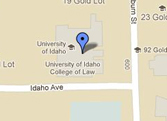College of Law
Moscow

uilaw@uidaho.edu
Administration Office: 208-885-2255
Dean’s Office: 208-885-4977
fax: 208-885-5709
Menard 101
711 S. Rayburn Drive
Mailing Address:
College of Law
University of Idaho
875 Perimeter Drive MS 2321
Moscow, ID 83844-2321
Boise
First Monday - September 3, 2013
In this Issue:
- UI College of Law First-Year Enrollment Increases Despite Nationwide Downturn
- National Jurist preLaw Magazine Ranks the College of Law Tops in Externships and Innovation
- Professionalism Orientation and Trial Advocacy Programs Bring Distinguished Lawyers and Judges to Campus
- Bellwood Speaker Morris Dees Works to Promote Tolerance and Dismantle Hate Groups
UI College of Law First-Year Enrollment Increases Despite Nationwide Downturn

“The excellence of our programs comes from the combined efforts of many people,” said Michael Satz, interim dean. “But the end result is that a law degree from the University of Idaho provides countless opportunities and a promising future. We are excited to welcome Idaho Law’s class of 2016 into our community.”
This year, most law schools experienced significant decreases in applications, Idaho Law, however, showed an 11.9 percent increase in applications, from 580 completed applications in 2012 to 658 in 2013.
According to the Law School Admission Council’s summary report, only three other schools nationwide saw increased applications of 10 percent or more in 2013. Nationally, applications were down 17.9 percent, and 20 percent in the Mountain West region. read more »
National Jurist preLaw Magazine Ranks the College of Law Tops in Externships and Innovation
In the 2013 Back to School issue of the National Jurist’s preLaw magazine, the University of Idaho College of Law received recognition for our externship offerings and was named in the top 25 most innovative law schools in the country.
The magazine rated law schools for the percentage of externship spots to full-time student body. The College of Law was ranked 15th in the nation with a score of 47.9 percent. The College of Law has long had a robust externship program adding new placement options every year. Externships have become a critical component of students’ law school experience helping to bridge the gap between theory and practice and to help students gain the work experience employers want.
The College of Law also scored high in the magazine’s rating of the 25 most innovative ideas coming from the nation’s law schools. The article profiled law schools that are “shunning tradition and trying new programs, teaching methods and other efforts to help graduates jet to the top of their profession.” The College of Law was number 18 on the list for innovation in off-site campuses for the creation of the third-year program in Boise.
We are proud to receive this national recognition for the quality and value of the legal education provided at the College of Law. Special thanks to our externship staff, Katie Ball in Boise and Sunil Ramalingam in Moscow, and to our externship placement supervisors for helping us achieve this recognition.
Professionalism Orientation and Trial Advocacy Programs Bring Distinguished Lawyers and Judges to Campus

View more photos of the Professionalism Orientation Day for the Class of 2016
Over 40 lawyers and judges visited campus during Orientation week to mentor our College of Law students. On Monday, August 19, 32 lawyers and judges participated in the Professionalism Orientation program for our incoming class. This program introduces our new law students to civility in the profession. Students meet in small groups to discuss various ethical scenarios. They are asked by the mentors to identify the ethical pitfalls and what course of action they might have taken as the lawyer. This program offers students the opportunity to interact with leaders in the profession. One student commented: “I’ve told my friends at other law schools that in my first week I was shaking hands with the state attorney general and several state Supreme Court justices, not to mention tons of other legal movers and shakers. They were all jealous of me.”
Also during the week, the College of Law held our 2013 Trial Advocacy program—the 35th anniversary of the program. The Trial Advocacy Program or “Boot Camp” as the annual program is often called, is a week-long intensive program modeled after the National Institute for Trial Advocacy. The program gives students the opportunity to learn practical trial skills from experienced practitioners and law faculty. The program culminates in a case tried before a jury made up of some of the 1L incoming students. This year, 12 attorneys and members of the faculty served as trainers in the program. Professor Maureen Laflin is the program director.
We are grateful to the following attorneys, judges, and faculty members who took time from their busy careers to participate in these programs.
Professionalism 2013 Mentors
Bob Aldridge, Boise
Hon. Barbara Buchanan, Sandpoint
Julia Crossland, Boise
Hon. Candy Dale, Boise
Jim Dickinson, Boise
Andy Doman, St. Maries
Hon. Daniel Eismann, Boise
Michelle Evans, Moscow
Trudy Fouser, Boise
Jana Gomez, Boise
Tim Gresback, Moscow
Michelle Gustavson, Boise
Sarah Haan, Moscow
Hon. Joel Horton, Boise
Larry Hunter, Boise
Hon. Molly Huskey, Caldwell
Megan Johnson, Sandpoint
Hon. Warren Jones, Boise
Hon. John Judge, Moscow
Hon. Karen Lansing, Boise
Hon. John Melanson, Boise
Kinzo Mihara, Coeur d’Alene
Sherry Morgan, Boise
Gene Petty, Boise
Lance Salladay, Boise
Hilary Soltman, Boise
Laird Stone, Twin Falls
Sara Thomas, Boise
Hon. Lawrence Wasden, Boise
Bill Wellman, Nampa
Bob Wetherell, Boise
Bud Yost, Nampa
Trial Advocacy Trainers
Noel Larrivee
Assistant Director Trial Advocacy Training
Maureen Laflin
Director of Clinical Programs, University of Idaho
David L. Metcalf
Chambers of Chief Judge Winmill
Kathleen Elliott
Elliott Law Office
Wendy Olson
U.S. Attorney for Idaho
Tracey Whelan
U.S. Attorney’s Office
Teresa Hampton
Federal Defender’s Office
Dick Ruben
Federal Defender’s Office
Tom Monaghan
Federal Defender’s Office
Jan Bennetts
Ada County Prosecutor’s Office
Jessica Long
Visiting Associate Professor, University of Idaho
Sunil Ramalingam
Assistant Clinical Professor, University of Idaho
Bellwood Speaker Morris Dees Works to Promote Tolerance and Dismantle Hate Groups

The SPLC is a nonprofit civil rights organization dedicated to fighting hate and bigotry and seeking justice for society’s most vulnerable members. Recognized internationally, the SPLC tracks and exposes the activities of hate groups. While the center is based in Montgomery, Alabama, they also have offices in Atlanta, New Orleans, Miami, and in Jackson, Mississippi.
Known for his innovative lawsuits that dismantled some of America’s most notorious white supremacist hate groups, Dees has received more than 20 honorary degrees and numerous awards, including Trial Lawyer of the Year from Trial Lawyers for Public Justice, the Martin Luther King Jr. Memorial Award from the National Education Association and The Salem Award for Human Rights and Social Justice. In 2006, Dees was named one of the 100 most influential lawyers in America by the National Law Journal. In addition, the University of Alabama Law School and the New York law firm Skadden, Arps, Slate, Meagher & Flom jointly created the annual Morris Dees Justice Award to honor a lawyer devoted to public service work.
In 1991, the SPLC established the Teaching Tolerance program, which reaches out to youth to educate them about tolerance and harmony in a society. The program exists as part of an educational series meant to fight hate crimes and educate people about them. The Teaching Tolerance program produces and distributes—free of charge—documentary films, books, lesson plans and other materials to promote tolerance and respect in our nation’s schools. The program works to foster inclusive, nurturing school environments—classrooms where equality and justice are taught and lived. It helps teachers prepare a new generation to live in a diverse world.
Teaching Tolerance has produced award-winning documentary films about the civil rights movement and the struggle for social justice, bringing history to life on the screen and teaching students that they can make a difference in the world around them. Two of the films, Mighty Times: The Children’s March and A Time for Justice, have won Academy Awards in the short documentary category. Teaching Tolerance magazine reaches more than 400,000 educators nationwide. Published twice a year and provided free to educators, the magazine was the first national forum where K-12 educators could exchange fresh ideas for teaching about diversity.


